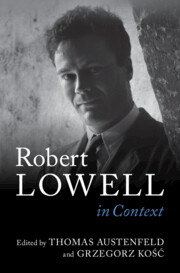Book contents
- Robert Lowell in Context
- Robert Lowell In Context
- Copyright page
- Dedication
- Contents
- Contributors
- Acknowledgments
- Abbreviations
- Introduction
- Part I Places
- Part II American Politics, American Wars
- Part III Some Literary Models
- Part IV Contemporaries
- Part V Life, Illness, and the Arts
- Part VI Reputation and New Contexts
- Chapter 21 Letters
- Chapter 22 Whiteness
- Chapter 23 Appropriation
- Chapter 24 “Raw” Poets
- Chapter 25 Lowell’s Influence
- Chapter 26 Language and Post-Language Poets
- Further Reading
- Index
Chapter 24 - “Raw” Poets
from Part VI - Reputation and New Contexts
Published online by Cambridge University Press: 28 March 2024
- Robert Lowell in Context
- Robert Lowell In Context
- Copyright page
- Dedication
- Contents
- Contributors
- Acknowledgments
- Abbreviations
- Introduction
- Part I Places
- Part II American Politics, American Wars
- Part III Some Literary Models
- Part IV Contemporaries
- Part V Life, Illness, and the Arts
- Part VI Reputation and New Contexts
- Chapter 21 Letters
- Chapter 22 Whiteness
- Chapter 23 Appropriation
- Chapter 24 “Raw” Poets
- Chapter 25 Lowell’s Influence
- Chapter 26 Language and Post-Language Poets
- Further Reading
- Index
Summary
It is conventional to assume that there was an unbreachable gulf between Robert Lowell and the experimental, “raw” poets associated with the broad avant-garde movement known as “The New American Poetry”; that he and poets like Allen Ginsberg, Frank O’Hara, Charles Olson, and their descendants operated in almost wholly separate universes. However, this chapter argues that Lowell’s relationship with these poets and their work is more extensive, complex, and messy than has often been assumed. As it demonstrates, Lowell’s famous transformation that led to the publication Life Studies was profoundly shaped by his encounter with the avant-garde tradition. Although Lowell’s division of the poetry world into two starkly opposed camps (the “cooked” and the “raw”) quickly became gospel, Lowell actually believed his own new mode to be a bold compromise between the two poles – an attempt to split the difference between "cooked" and "raw," New Critical formalism and the New American Poetry.
Keywords
- Type
- Chapter
- Information
- Robert Lowell In Context , pp. 262 - 271Publisher: Cambridge University PressPrint publication year: 2024

